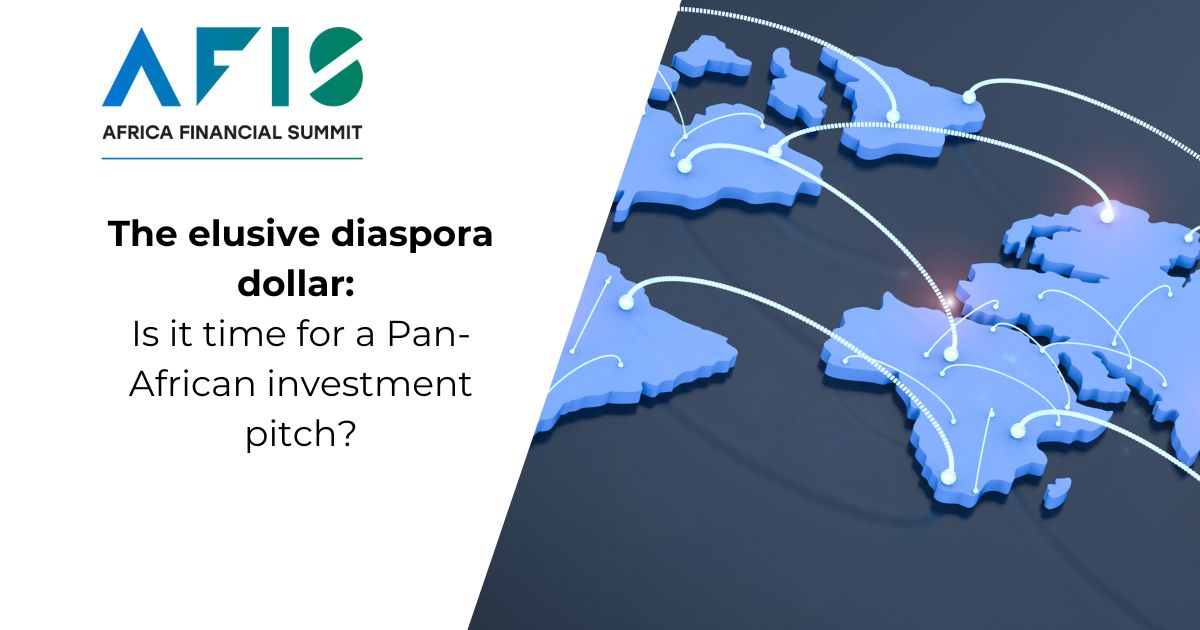Capturing Africa’s elusive diaspora dollar: Is it time for a Pan-African investment pitch?

As Kenya hopes to raise up to $500m from diaspora bonds by 2026, should past performance of national diaspora bonds on the continent cause concern? AFIS explores if cross-border coordination to market Pan-African projects rather than national infrastructure projects, could help states attract capital from a group that has not yet fully bought into African investing.
By Oliver Nieburg, programme lead for the Africa Financial Summit – AFIS
Diaspora bonds have in the last decade and a half captured the imagination as an innovative source of financing to exploit the $50 billion+ in annual savings held by African citizens living overseas. Few have been issued, but their African track record has partly fallen short of expectations.
Nigeria’s 2017, $300m diaspora bond was a notable exception that met and surpassed targets, which has led the West African state to consider issuing a $500m diaspora bond this year targeting Nigerians and Nigerian descendants living in the US.
But since 2007, limited market awareness and international scepticism about African assets have caused diaspora bonds from countries like Ethiopia, Ghana, and Kenya to be undersubscribed.
Patriotic affinity or kinship with Africa will never be enough to attract investors
Some nations have turned to general infrastructure bonds in which the diaspora can participate instead of dedicated diaspora bonds, an approach helping to net previously elusive diaspora investment. Ethiopia’s $7bn Grand Ethiopian Renaissance Dam (GERD) for instance was partly financed by an infrastructure bond that drew more than $50 million from the diaspora.
According to discussions that took place at AFIS – a platform built around the Africa Financial Summit -results could be amplified by widening the definition of the diaspora and selling lucrative Pan-African infrastructure investment opportunities, whereby risk is not concentrated in a single nation.
Marketing the Pan-African investment opportunity
Distrust in the issuing government, and perceived risks of investing in a single African nation have contributed to the limited success of diaspora bonds. Investors are weary that a poor economic outlook for an issuing African country will result in a poor return on investment.
Patriotic affinity or kinship with Africa will never be enough to attract investors. The business case for infrastructure bonds must be compelling.
With the African Continental Free Trade Area (AfCFTA) forecast to uplift African GDP 4.2% by 2035, according to Fitch, cross-border infrastructure projects packaged as capitalising on a lucrative pan-African opportunity may be a route to inspire investor confidence.
Multi-country involvement on cross-border transport, logistics, energy and digital infrastructure projects could give diaspora investors assurance that they are buying into quality assets, particularly if backed by multi-state guarantees.
Africans states may also re-examine which individuals are considered diaspora investors.
Such Pan-African bonds or cross-border bonds will undoubtedly be complicated to arrange and would require cooperation between diverse states – Africa after all is not a country.
Yet a smart collective approach could bring relief to a $411bn deficit in transport infrastructure and equipment investment needed by around 2030 to enable intra-continental trade flows.
Africa’s hidden investors: The Diaspora we forgot to ask
Africans states may also re-examine which individuals are considered “diaspora” investors. Sovereign diaspora bonds have to date mainly targeted national citizens or their descendants living abroad.
Broadening the diaspora scope to all those with an affinity to Africa or an African nation could enlarge the investor base.
It does not necessarily have to be a Rwandan investing in Rwandan assets. African Americans, Afro-Caribbeans, a European-born investor with Ivorian ancestry, international scholars with African interests or foreign workers previously based in Africa that have no ancestral link could be targeted alongside Rwandan citizens abroad.
But data on these communities and even on the traditional diaspora (overseas citizens) is lacking. Angola in 2018 for instance started discussions on issuing a diaspora bond but had no concrete information on its diaspora to advance.
Setting up public taskforces to develop national datasets, updated every two years, on the broader diaspora community that have African interests could be a first step to strenghtening data. This could then feed a Pan-African diaspora database, and the community could be engaged on sovereign infrastructure bond participation and targeted for bolder pan-African investment opportunities.
A tailored message to sub-groups
The taskforces behind national diaspora databases will need to identify engagement strategies for sub-groups within the community as the diaspora is far from a homogenous group. An African American lawyer may need to be engaged differently to a diaspora target with limited financial means and education.
If national datasets were combined, stakeholders could develop a Pan-African diaspora community on digital outreach channels, engage them regularly on issues of interest to the diaspora, and inform them of infrastructure bond opportunities.
This data could be shared with non-profit African diaspora organisations, so the investment opportunities are raised via their channels and events.
To date, few countries have succeeded with national diaspora bonds aside from India, Israel and Nigeria.
Could Pan-African investment opportunities – strategically marketed to a larger diaspora group by national taskforces armed with solid data – make the diaspora active investors in the continent’s economic future?
This article draws on insights from past Africa Financial Summit sessions that featured the capital market authorities of Ethiopia and Angola, Ecobank, and the International Finance Corporation (IFC).